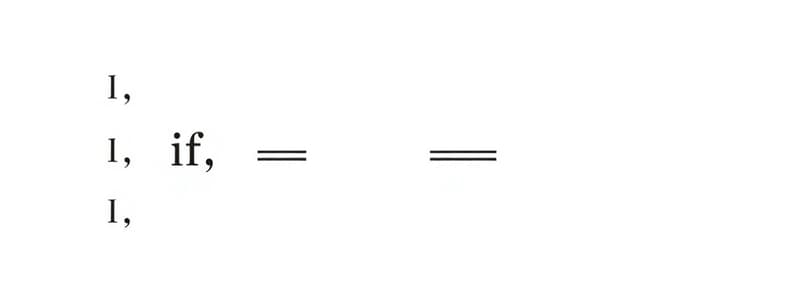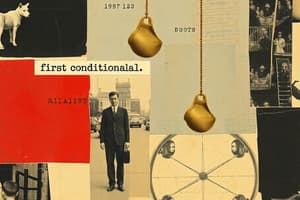Podcast
Questions and Answers
Which conditional type is used to express a hypothetical situation in the past and its unrealized consequence?
Which conditional type is used to express a hypothetical situation in the past and its unrealized consequence?
- Zero Conditional
- Third Conditional (correct)
- First Conditional
- Second Conditional
In which conditional structure does the if-clause use the simple past tense?
In which conditional structure does the if-clause use the simple past tense?
- Third Conditional
- Second Conditional (correct)
- Zero Conditional
- First Conditional
Which sentence correctly illustrates the first conditional?
Which sentence correctly illustrates the first conditional?
- If I had known, I would have come.
- If it rains, the ground gets wet.
- If she studies, she will pass the exam. (correct)
- If I won a million dollars, I would travel the world.
What is the correct verb form in the if-clause of a zero conditional sentence?
What is the correct verb form in the if-clause of a zero conditional sentence?
Which statement uses 'if only' correctly?
Which statement uses 'if only' correctly?
Which type of conditional is suitable for expressing a general truth?
Which type of conditional is suitable for expressing a general truth?
Which of the following conditional types is mixed with elements from different conditionals?
Which of the following conditional types is mixed with elements from different conditionals?
Identify the correct form for the main clause of a second conditional sentence.
Identify the correct form for the main clause of a second conditional sentence.
Flashcards
Conditional Clause
Conditional Clause
A clause that expresses a hypothetical or conditional situation, describing a condition and its consequence.
Zero Conditional
Zero Conditional
Describes general truths, scientific facts, or habitual situations. Uses the simple present tense in both the if-clause and main clause.
First Conditional
First Conditional
Expresses a possible future situation and its probable result. The if-clause uses the simple present tense, and the main clause uses the future simple tense.
Second Conditional
Second Conditional
Signup and view all the flashcards
Third Conditional
Third Conditional
Signup and view all the flashcards
If Only Structures
If Only Structures
Signup and view all the flashcards
Mixed Conditionals
Mixed Conditionals
Signup and view all the flashcards
Main Clause and If-Clause
Main Clause and If-Clause
Signup and view all the flashcards
Study Notes
Conditional Clauses in English (if-clauses)
- Conditional clauses, often called if-clauses, express a hypothetical or conditional situation. They describe a condition and a consequence.
- If-clauses come in different types, each expressing a different degree of possibility or certainty. The most common types are zero, first, second, and third conditional.
Zero Conditional
- Used to describe general truths, scientific facts, or habitual situations.
- The if-clause and the main clause use the simple present tense.
- Examples:
- If you heat water to 100 degrees Celsius, it boils.
- If it rains, the ground gets wet.
- If I eat too much, I feel sick.
First Conditional
- Used to express a possible future situation and its probable result.
- The if-clause uses the simple present tense, and the main clause uses the future simple tense (will + verb).
- Examples:
- If it doesn't rain tomorrow, we will go to the beach.
- If you study hard, you will pass the exam.
- If she finishes her work early, she will come to the party.
Second Conditional
- Used to express an improbable or imaginary situation in the present or future, and its hypothetical result.
- The if-clause uses the simple past tense, and the main clause uses would + verb.
- Examples:
- If I won the lottery, I would buy a new house.
- If she had more time, she would learn a new language.
- If we lived in a different country, we would visit more historical sites.
Third Conditional
- Used to describe a hypothetical situation in the past and its unrealized consequence.
- The if-clause uses the past perfect tense, and the main clause uses would have + past participle.
- Examples:
- If I had studied harder, I would have passed the exam.
- If she had called earlier, we would have met her.
- If they had known about the problem, they would have acted sooner.
Other Conditional Structures
- While the above are the most common, other conditional structures exist.
- "If only" structures express regret or wish, often about something in the present or the past.
- Examples:
- If only I had known that you were coming.
- If only I could speak fluent French.
- Notice they use different tenses than the standard conditional sentence constructions.
- Examples:
- Mixed conditionals combine elements of different types; for example, a situation in the past affecting something in the present.
- Different ways of expressing the condition, such as:
- Using "unless" (meaning "if not")
- Using "suppose," or "what if" (introducing a hypothetical situation)
Important Considerations
- The tense in the main clause depends directly on the type of condition.
- The meaning of the conditional clause heavily influences the use of the proper tense.
- The context is essential for correct interpretation and use of conditional structures.
Studying That Suits You
Use AI to generate personalized quizzes and flashcards to suit your learning preferences.




